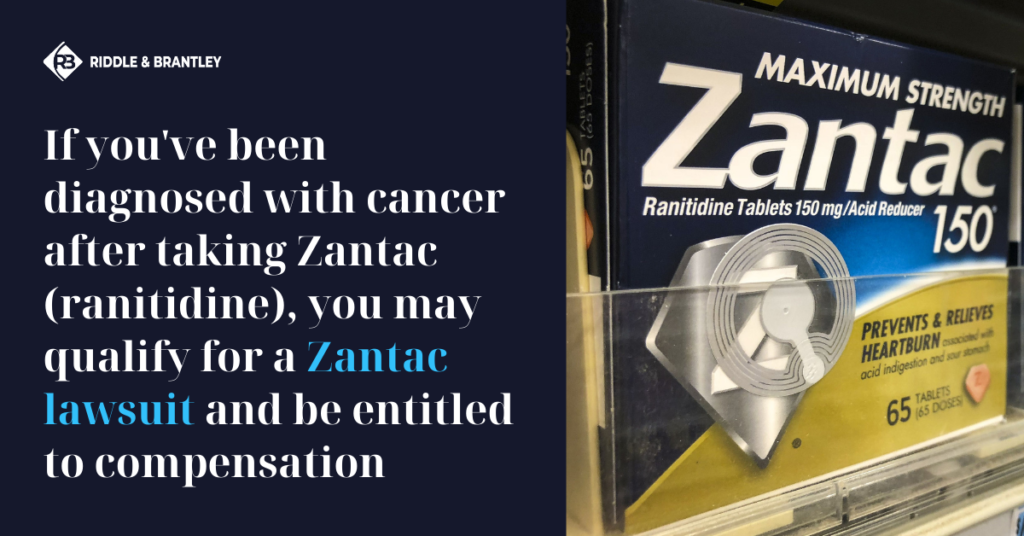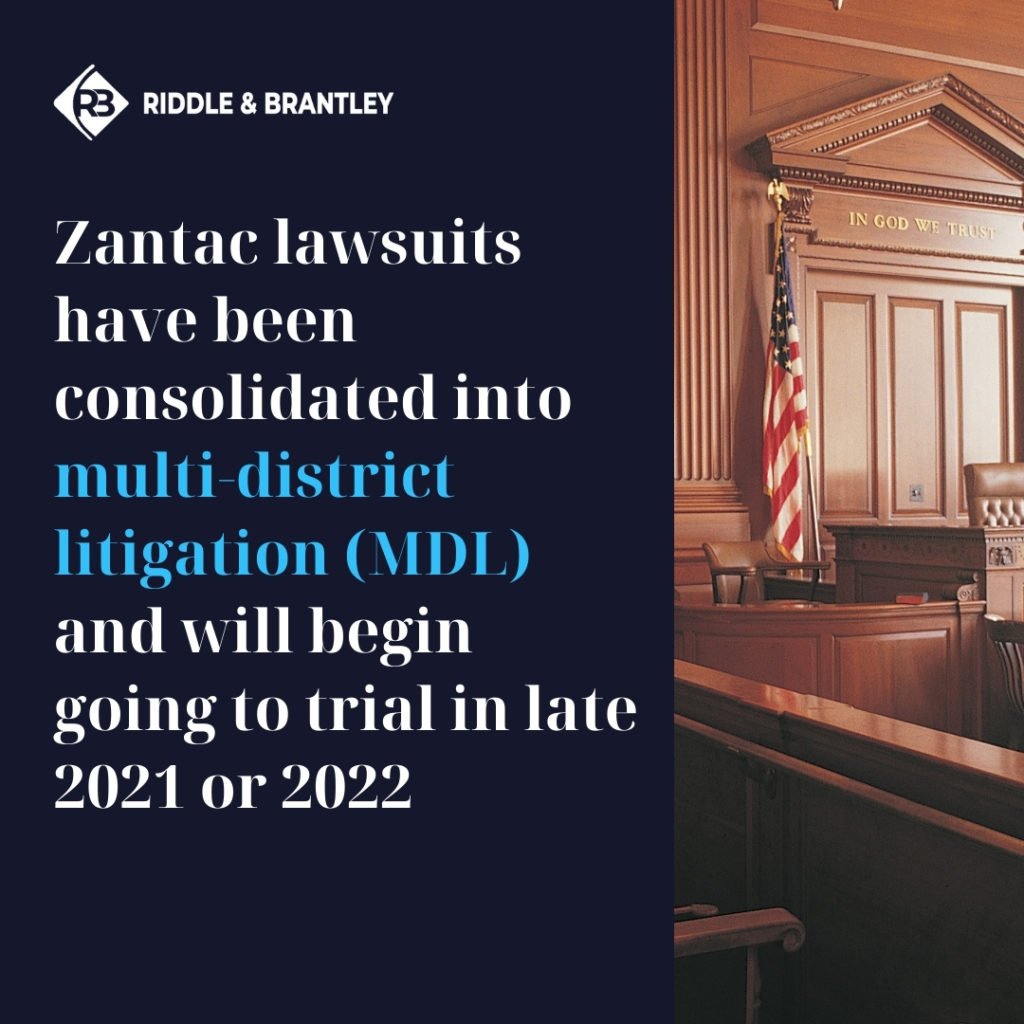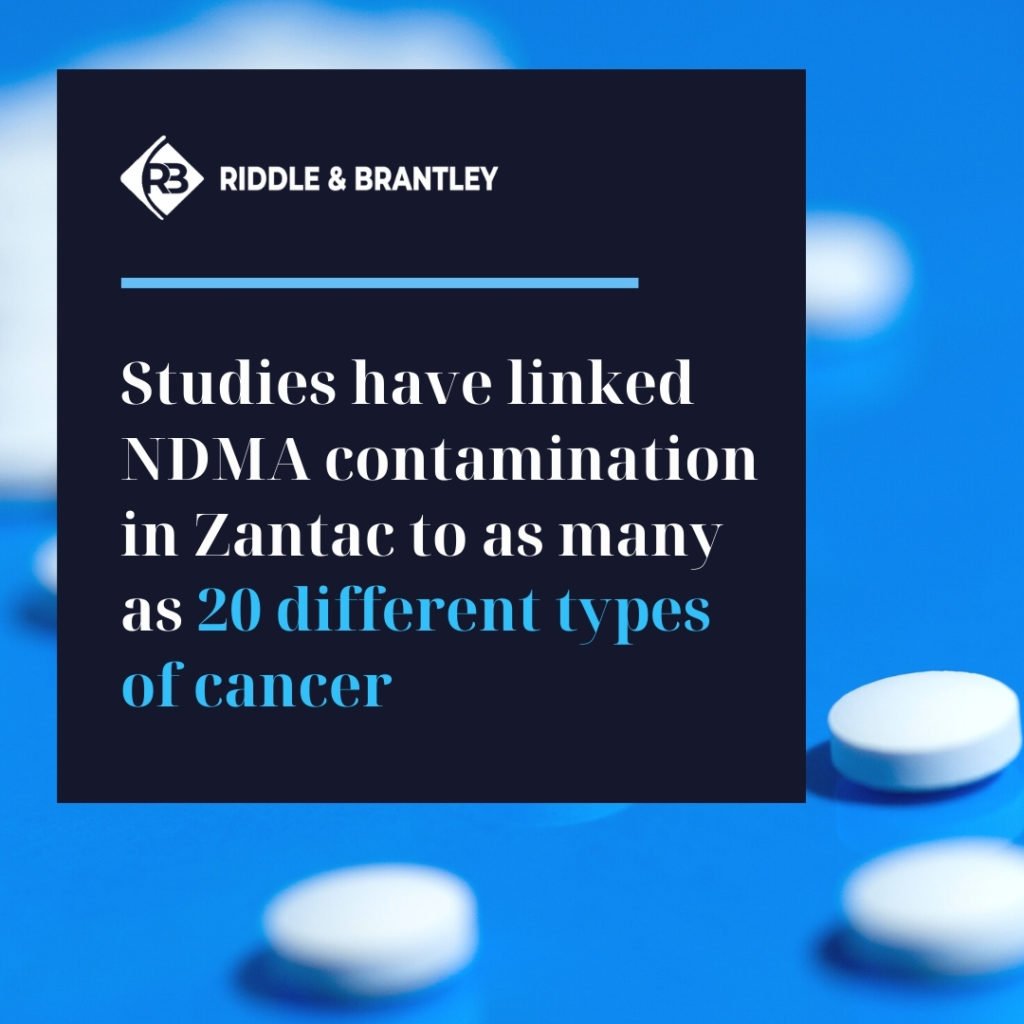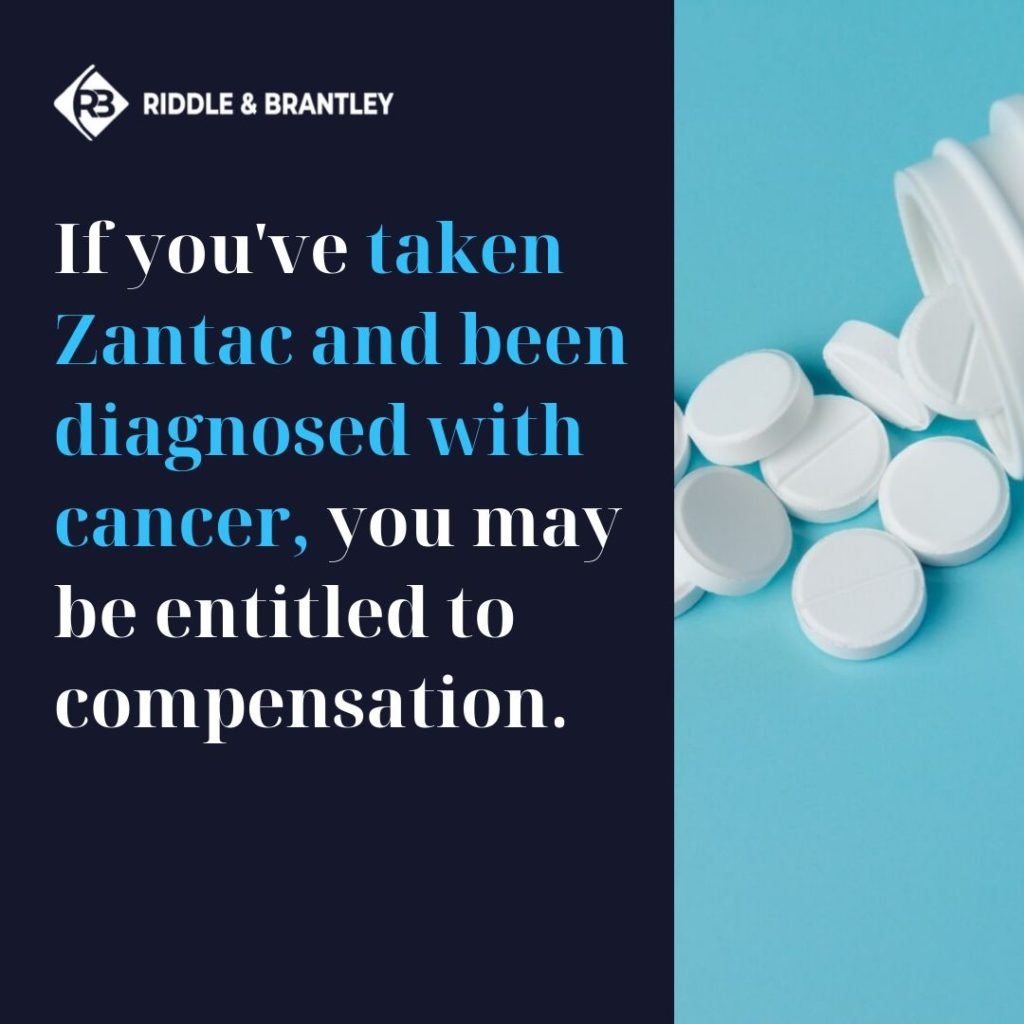Zantac Lawsuit Attorneys
Zantac Lawyer
FEBRUARY 2023 UPDATE: Due to recent developments in the litigation, our firm is no longer accepting Zantac claims. Please stay tuned to our website for the latest information and updates.
Have you or a loved one taken Zantac?
 WARNING: Zantac may cause cancer and those who have taken Zantac or ranitidine may be at risk. If you or a loved one have suffered from cancer potentially due to Zantac (ranitidine), you may be entitled to compensation. For a FREE, no-obligation consultation with an experienced Zantac lawyer, please call 1-800-525-7111. There are no attorney fees unless we recover compensation for you.
WARNING: Zantac may cause cancer and those who have taken Zantac or ranitidine may be at risk. If you or a loved one have suffered from cancer potentially due to Zantac (ranitidine), you may be entitled to compensation. For a FREE, no-obligation consultation with an experienced Zantac lawyer, please call 1-800-525-7111. There are no attorney fees unless we recover compensation for you.
For more information on what kind of cancer is caused by Zantac, please visit our online guide.
January 2023 Update: A federal judge recently ruled against Zantac lawsuits, threatening the litigation. Given this ruling, Riddle & Brantley is not able to accept any additional Zantac claims prior to a potential reconsideration or successful appeal. Please stay tuned to our website for the latest details in this ongoing litigation.
IMPORTANT: A federal judge recently ruled against lawsuits concerning generic Zantac. At this point, we can only accept cases concerning use of brand-name Zantac OR “mixed” use of brand-name Zantac and generic equivalents.
PLEASE NOTE: At this time, the federal MDL has limited the Zantac claims we can accept to bladder, esophageal, stomach, liver, and pancreatic cancers only. We understand that other cancers may be linked, but we are unfortunately unable to assist with these claims at this time due to evidence and recent court rulings.
Zantac NDMA Contamination
In 2020, the FDA issued an urgent ZANTAC RECALL and FDA Zantac warning after finding that Zantac and generic ranitidine are contaminated with NDMA, a chemical that may cause cancer.
Due to cancer risks associated with Zantac, Walgreens, CVS and Rite-Aid had all previously stopped selling Zantac and its generic equivalents. The FDA has also ordered Zantac and generic ranitidine manufacturers to stop selling prescription and over-the-counter varieties of the medication.
Zantac Lawsuit
FEBRUARY 2023 UPDATE: Due to recent developments in the litigation, our firm is no longer accepting Zantac claims. Please stay tuned to our website for the latest information and updates.
You may be eligible for a potential Zantac lawsuit and be entitled to financial compensation if you have taken Zantac or ranitidine and been diagnosed with cancer as a result of NDMA in Zantac. Legal analysts anticipate potentially that significant Zantac claims may be on the horizon, and we are determined to help you get justice however we can.
 For a FREE consultation with an experienced Zantac lawyer, call 1-800-525-7111.
For a FREE consultation with an experienced Zantac lawyer, call 1-800-525-7111.
The consultation is free and there are no upfront costs or attorney fees unless we win your case — and you receive financial compensation.
Our firm has been fighting to hold drug companies accountable since 1985. If you’ve been diagnosed with cancer after taking Zantac or generic ranitidine, you may have a claim for Zantac class action lawsuit and be entitled to compensation.
NOTE: Technically, Zantac lawsuits are mass tort cases — not class actions — and part of multi-district litigation (MDL). This means that every Zantac claim is individual, but cases are consolidated together in order to streamline the judicial process. “Class action” is a term commonly associated with these types of cases, however.
“It was nice to see Riddle & Brantley put me and my needs first.”
–R. Colley, Riddle & Brantley client
How to Qualify for a Zantac Lawsuit
FEBRUARY 2023 UPDATE: Due to recent developments in the litigation, our firm is no longer accepting Zantac claims. Please stay tuned to our website for the latest information and updates.
You may be entitled to compensation for injuries suffered potentially as a result of taking brand-name Zantac.
You may qualify for a Zantac lawsuit if you meet the following criteria:
- Used brand-name Zantac only
- Suffered from at least one of the following cancers:
- Bladder cancer
- Liver cancer
- Stomach cancer
- Esophageal cancer
- Pancreatic cancer
- Must have used brand-name Zantac after October 1984
- Must have used brand-name Zantac for a minimum of one year
- Must have used brand-name Zantac once per week for a minimum of six months
- Must have been diagnosed with a qualifying cancer within 20 years of last dose
- Must not have been a smoker in the past 20 years if diagnosed with lung cancer
- Must be 64 years of age or younger at the time of diagnosis if diagnosed with prostate cancer
Certain other criteria may apply. For a FREE, no-obligation consultation with an experienced Zantac lawsuit attorney, please call 1-800-525-7111.
PLEASE NOTE: At this time, the federal MDL has limited the Zantac claims we can accept to bladder, esophageal, stomach, liver, and pancreatic cancers only. We understand that other cancers may be linked, but we are unfortunately unable to assist with these claims at this time due to evidence and recent court rulings.
For a FREE consultation with a Zantac cancer lawyer, please call 1-800-525-7111.
The Zantac lawsuit attorneys at Riddle & Brantley have been representing injured victims for more than three decades. We are committed to holding drug companies accountable whose negligence results in injury. Zantac touches all of us. Some of our staff at Riddle and Brantley have taken this drug along with members of their families. We are actively investigating these Zantac cancer risk cases now.
If you or a loved one have taken Zantac and been diagnosed with cancer, please call 1-800-525-7111 for a FREE case review and consultation.
Allegations Against Zantac
Lawsuits against Zantac manufacturers make two primary allegations:
- Defective design — Zantac lawsuits claim that Zantac was inherently flawed, and that the drug’s formulation needlessly put patients at risk for certain types of cancer.
- Failure to warn — Zantac lawsuits claim that Zantac manufacturers were aware of dangers associated with NDMA contamination and failed to adequately warn consumers.
Defective Design
Drug manufacturers are held to a standard of strict liability. Under this “strict liability” standard, a drug manufacturer may be liable for damages caused by a pharmaceutical like Zantac if two criteria are met:
- The drug’s defective design posed a “foreseeable risk”
- The drug was manufactured and used as it was supposed to be
According to recent research, ranitidine molecules are “inherently unstable.” To make a long story short, NDMA contamination is considered by scientists to be a direct result of the nature of ranitidine. Essentially, therefore, NDMA contamination in Zantac is by design, and any manufacturer may be held liable.
Failure to Warn
Like any FDA-approved drug, Zantac and ranitidine medications were required to carry a warning label. However, these warning labels did not include mention of any risk of NDMA contamination or cancer. Because NDMA contamination and/or increased cancer risk were not included on the medication warning label, Zantac manufacturers may be held liable under the “failure to warn” standard of product liability law.
Zantac Lawsuit Status
 What’s the status of Zantac lawsuits? Zantac lawsuits have been consolidated into multi-district litigation (MDL). This means that while individual cases remain separate, they have been grouped together in order to streamline the judicial process. Zantac lawsuits have been consolidated in federal courts in the Southern District of Florida.
What’s the status of Zantac lawsuits? Zantac lawsuits have been consolidated into multi-district litigation (MDL). This means that while individual cases remain separate, they have been grouped together in order to streamline the judicial process. Zantac lawsuits have been consolidated in federal courts in the Southern District of Florida.
FEBRUARY 2023 UPDATE: Due to recent developments in the litigation, our firm is no longer accepting Zantac claims. Please stay tuned to our website for the latest information and updates.
IMPORTANT: A federal judge recently ruled against lawsuits concerning generic Zantac. At this point, we can only accept cases concerning use of brand-name Zantac OR “mixed” use of brand-name Zantac and generic equivalents.
Even though the Zantac MDL is based in Florida, potential victims across the United States may be able to join a Zantac cancer lawsuit. Trials are not anticipated to begin until late 2021 or even 2022, but it is important that those diagnosed with cancer after taking Zantac act quickly — due to varying statutes of limitations and other requirements, it is important that you request a consultation with a Zantac lawyer as soon as possible.
For a FREE, no-obligation consultation with an experienced Zantac lawyer, please call 1-800-525-7111 or complete the fast and easy form below.
There are no upfront costs and we don’t get paid unless you do. If we don’t recover compensation for you in a Zantac lawsuit, you won’t pay any attorney fees. Call 1-800-525-7111 and let’s review your claim.
What is Zantac?
Zantac is one of the most popular over-the-counter (OTC) medicines for preventing and treating heartburn, sometimes called acid reflux. These medications are sometimes called antacids. The generic substitute for Zantac is called ranitidine.
Zantac and other antacids work by reducing the production of acid in the stomach.
Heartburn, or acid reflux, is one of the most common medical conditions in the United States. According to the American College of Gastroenterology, 60 million Americans report having heartburn at least once per month.
Zantac (ranitidine) is frequently used to treat conditions and diseases such as:
- Heartburn (acid reflux)
- Peptic ulcer disease
- Stress-induced ulcers
- Gastroesophageal reflux disease (GERD)
- Zollinger-Ellison syndrome
- Hives (off-label usage)
- Anaphylaxis (secondary treatment)
Ranitidine (the generic equivalent of Zantac) has been listed on the World Health Organization’s List of Essential Medicines, and as of 2016 was the 50th most prescribed medication in the United States.
Zantac is available over-the-counter (without a prescription) in pharmacies across the United States. Zantac lawsuits may apply to generic ranitidine prescription and over-the-counter medications, as well.
Zantac and Ranitidine Manufacturers
Manufacturers of Zantac and ranitidine affected by the FDA recall and potential lawsuits include but are not limited to:
- Amneal Pharmaceuticals
- Mylan Pharmaceuticals
- Sanofi
- Sandoz
- Perrigo Co.
- Apotex Corp.
- Glenmark Pharmaceuticals
- Novitium Pharma
Does Zantac Cause Cancer?
 In October 2019, the Food and Drug Administration (FDA) issued a warning that Zantac and certain generic formulations of ranitidine are contaminated with NDMA — a dangerous chemical that can potentially cause cancer.
In October 2019, the Food and Drug Administration (FDA) issued a warning that Zantac and certain generic formulations of ranitidine are contaminated with NDMA — a dangerous chemical that can potentially cause cancer.
The warning was followed by an FDA recall of Zantac and other ranitidine-containing medications.
NDMA stands for N-nitrosodimethylamine. NDMA is a semi-volatile organic chemical that is known to be toxic to the liver, among other organs. It is also believed to be cancer-causing in humans. In fact, NDMA is used to create cancer in rats in lab testing.
According to the FDA:
“NDMA is classified as a probable human carcinogen (a substance that could cause cancer) based on results from laboratory tests.”
LEARN MORE: For more information on Zantac, potential cancer risk, and Zantac lawsuits, please see our Zantac cancer risk and lawsuits FAQ page.
“I’m Taking Zantac. What Should I Do?”
Those taking Zantac or ranitidine are advised to talk with their doctor about potential Zantac alternatives. The FDA also advises patients who are taking over-the-counter Zantac to immediately stop taking the medication and seek alternatives, as well.
Walgreens and CVS pharmacies are also offering concerned patients a full refund for returning their Zantac medication.
Zantac Resource Center
Please review these helpful resources for more information related to Zantac lawsuits, cancer risk, and recalls.
Zantac Lawsuit Updates
- Zantac MDL Status
- US District Court, Southern District of Florida – Zantac Multidistrict Litigation Updates
- Zantac “Bellwether” Trials
- Potential Zantac Settlement Amounts
Zantac Cancer Risk
- Does Zantac Cause Cancer?
- What Kind of Cancer Can NDMA in Zantac Cause?
- Is the “New” Zantac Safe? (Zantac 360)
- Zantac Alternatives
Zantac Recalls
Zantac Lawsuit Claims
FEBRUARY 2023 UPDATE: Due to recent developments in the litigation, our firm is no longer accepting Zantac claims. Please stay tuned to our website for the latest information and updates.
 January 2023 Update: A federal judge recently ruled against Zantac lawsuits, threatening the litigation. Given this ruling, Riddle & Brantley is not able to accept any additional Zantac claims prior to a potential reconsideration or successful appeal. Please stay tuned to our website for the latest details in this ongoing litigation.
January 2023 Update: A federal judge recently ruled against Zantac lawsuits, threatening the litigation. Given this ruling, Riddle & Brantley is not able to accept any additional Zantac claims prior to a potential reconsideration or successful appeal. Please stay tuned to our website for the latest details in this ongoing litigation.
If you or a loved one has taken brand-name Zantac and been diagnosed with cancer, NDMA contamination may be responsible, and you may be entitled to compensation.
To see if you may qualify for a Zantac lawsuit, please call 1-800-525-7111.
The consultation is FREE and there is no obligation. As always, there are no upfront costs and no attorney fees unless we win your case and you receive financial compensation.
Victims of negligence committed by drug companies deserve justice, and Riddle & Brantley has been fighting for injured clients since 1985.
“Drug companies whose negligence results in injury or death must be held accountable.”
-Gene Riddle
If Zantac was contaminated with NDMA which resulted in cancer, many victims may have claims for compensation.
PLEASE NOTE: At this time, the federal MDL has limited the Zantac claims we can accept to bladder, esophageal, stomach, liver, and pancreatic cancers only. We understand that other cancers may be linked, but we are unfortunately unable to assist with these claims at this time due to evidence and recent court rulings.
If you’ve taken Zantac and been diagnosed with cancer potentially caused by NDMA contamination, talk with a Riddle & Brantley dangerous drug attorney today.
You don’t have to go through this alone — and you deserve justice.
Call 1-800-525-7111 for a FREE consultation and case review with an experienced personal injury attorney handling Zantac lawsuits.
Why Riddle & Brantley for Your Zantac Lawsuit?
Riddle & Brantley has been fighting on behalf of those injured due to negligence for more than three decades. Together, our dangerous drug attorneys have more than 220+ years of combined legal experience and we fight tirelessly for our deserving clients.
Since 2000 alone, our firm has recovered more than $600 million in compensation for victims of others’ negligence (see disclaimer below).
Award-Winning Attorneys
Our firm is led by attorney and managing partner Gene Riddle. Gene has been recognized as a member of Million Dollar Advocates Forum, Multi-Million Dollar Advocates Forum, SuperLawyers and The National Trial Lawyers Top 100. He maintains a prestigious AV Preeminent rating from Martindale-Hubbell and is the recipient of the 2014 Litigator Award (see disclaimer below).
Award-winning lawyers at Riddle & Brantley (see disclaimer below) include:
- Multi-Million Dollar Advocates Forum (Gene Riddle, Darren Dawson)
- Million Dollar Advocates Forum (Gene Riddle, Chris Brantley, Darren Dawson)
- Super Lawyers (Gene Riddle, Adam Smith, Darren Dawson)
- The National Trial Lawyers Top 100 (Gene Riddle, Darren Dawson)
- The National Association of Distinguished Counsel (Gene Riddle)
“This settlement changed me and my family’s lives.”
-Linda B., Riddle & Brantley client
In more than 30 years holding negligent parties responsible, we’ve secured many five, six and seven-figure settlements and judgments on behalf of our clients (see disclaimer below). We’re proud of our track record of success and would love to help you in your potential Zantac lawsuit case if we can.

If you or a loved one has been diagnosed with cancer after taking brand-name Zantac, please call 1-800-525-7111 for a FREE, no-obligation consultation with a Zantac lawsuit attorney at Riddle & Brantley.
We strive to treat our clients like family. We’ll listen to you, advise you on your legal options for pursuing a claim, and if you decide to hire us we will fight tirelessly for the justice and compensation you deserve. We invite you to review our client testimonials.
“I would recommend them to anyone. They fought hard for me.”
-Christine W., Riddle & Brantley client
Please call 1-800-525-7111 today and let’s review your case. You may be eligible for a Zantac lawsuit and be entitled to compensation.
***Disclaimer: No settlement agreement has been reached in any litigation regarding ranitidine (ZANTAC®), including in the Multidistrict Litigation in the United States District Court for the Southern District of Florida (case no. 20-MD-2924).
*** Disclaimer: The results mentioned are intended to illustrate the type of cases handled by the firm. These results do not guarantee a similar outcome, and they should not be construed to constitute a promise or guarantee of a particular result in any particular case. Every case is different, and the outcome of any case depends upon a variety of factors unique to that case.
*** Disclaimer: An attorney must meet certain requirements to join these organizations or receive these awards. For more information on Membership Criteria for Million Dollar Advocates Forum, Multi-Million Dollar Advocates Forum, Super Lawyers, The National Trial Lawyers Top 100, AV Preeminent by Martindale-Hubbell, and the Litigator Award, please visit our Membership Criteria page. These awards and memberships should not be construed as a promise or guarantee of a similar result. Each case is different and must be evaluated separately.